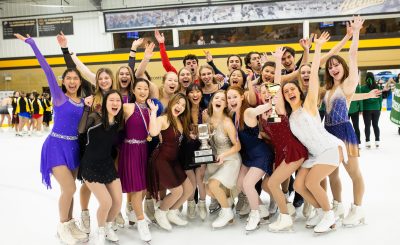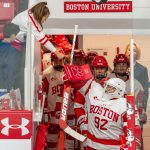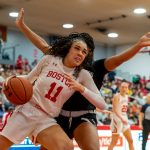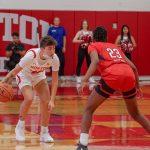It’s hard to think of someone more suited to coach Boston University’s club figure skating team than Andrea Mohns-Brillaud. A former Terrier herself, as well as a member of the team during her time at BU, she described coaching at her alma mater as her “dream job.”
Under the guidance of Mohns-Brillaud, the figure skating team has been Intercollegiate National Champions five times and three times in the last five years. They will look to win their sixth in the Spring, and they’re off to a strong start having won first place as a team in their first of three qualifying competitions.

They competed in a field of 20 schools ranging from New York University to Dartmouth College, and Mohns-Brillaud said the sport’s expansion is a far cry from the era in which she skated.
According to her, there were “maybe three or four teams that only had like two kids on a team. I have 34 kids on my team now … It’s grown a lot, and we’re competing against other teams that are just as big.”
Nowhere is this clearer than at BU. Questrom sophomore Philip Baker said that the size and success of the team afford it a level of respect and prestige that other club sports may lack.
“We’re treated pretty well for a club sport on campus when it comes to funding, when it comes to ice time,” Baker said. “There are a lot of people that decide to apply to BU because of the figure skating team.”
However, the large roster size puts Mohns-Brillaud in a tough spot when it comes time to decide who gets to compete and who doesn’t. In fact, she called it “the worst part of my job.”
“It wears on me very much because I’m a mom, and I see the kids and I see how hard they work,” Mohns-Brillaud said. “I don’t like breaking hearts.”
Baker explained that the selection process “gets really stressful,” but some members on the team who were left behind for the first competition of last season went back to the drawing board and improved their routines until they were selected for later competitions.
“It’s pretty similar to any sport,” Baker said. “You gotta fight for those roster spots.”
Even if a skater doesn’t get selected to compete, though, just being a part of the team is a rewarding experience. Co-President Emily Feng detailed the culture as one of collaboration and healthy competition.
“We all have the same shared goal of making sure everyone is prepared and making sure everyone does well for our team,” Feng said. “That is a huge factor for the success that we’ve had, the culture that we’ve built throughout all these years.”
Feng also described the off-ice bonding the team engages in, which includes events like Friendsgiving and a holiday gift exchange. All of this is in the pursuit of “making sure the team dynamic is looking good,” which is a primary concern of the club’s executive board.
If a skater wants to try and improve their skills between the fall and spring semesters, there is a thorough support system in place.
“If a student doesn’t make the first round of cuts, I give them things that they need to work on, and then we revisit it come the second semester,” Mohns-Brillaud said. “We always try to keep the door open in the hopes that someone can make the team.”
Once a skater is on the team, they might feel a lot of weight on their shoulders thanks to representing such a successful program. Still, Mohns-Brillaud said that the coaching staff prioritizes preparation over more goal-oriented mindsets.
“I always tell the kids that we focus on preparation, and if they’re focused on preparation, we’re not always thinking about the winning,” Mohns-Brillaud said. “If we prepare and we have a list of standards that they have to do to be prepared, I feel like they will be successful.”
Feng emphasized the importance of reaching out early and getting to know the coaches and the team.
“It’s hard going into something just not knowing at all what to expect,” Feng said. “We have a lot of prospective skaters that do reach out first, and we get to tell them all about the program and all about what we do, just to make them feel more prepared.”
Baker expressed gratitude for being able to pursue the sport in college and encouraged everybody with a figure skating background to try out for the team.
“I’m really fortunate to be able to do collegiate skating,” Baker said. “I highly recommend collegiate skating to any figure skater that’s about to attend college. It’s really a great experience to meet a lot of great people.”




